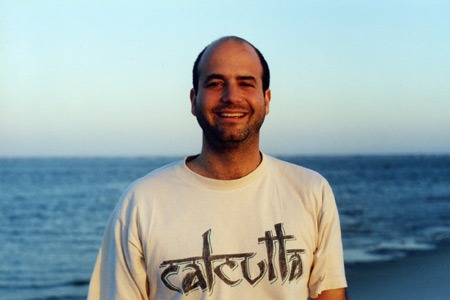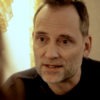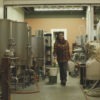
Family Dynamic
Written by Claudia Haydon | Posted by: Anonymous
It’s been a whirlwind of activity for Somerville filmmaker Inbal Goldstein since completing his first feature-length documentary film, "The Mothers’ Triangle" in August. Most recently, the film was one of 20 feature documentaries that screened in September at the IFP Market & Conference in New York, after having been selected from nearly 1,800 project submissions — an extraordinarily competitive year for all film categories, but in particular, for documentary. Inbal financed, directed, produced, filmed and edited "The Mothers’ Triangle" during a five-year production, and while working full-time.
Inbal has been creating independent narrative shorts and documentaries for nearly 20 years. Raised in Tel-Aviv, Israel until the age of nine, when he and his parents moved to the United States, Inbal has traveled and filmed extensively in Europe, Southeastern and Central Asia and the U.S. His short films have appeared in festivals and international television stations including the Haifa International Film Festival, Taos Talking Pictures, the New York International Independent Film and Video Festival, Local Sightings in New England, and Israeli Broadcast and Public Television. Inbal currently runs Igway Productions, his own independent film and video production company in Somerville.
"The Mothers’ Triangle" follows a Malden, MA-based mother, Mary Borges, 34, and her daughter, Christina, 18, over a period of four years. The two face profound challenges and conflicts as Christina becomes a teenage mother (to a baby boy named Cristian), as her own mother did only 18 years before. A devastating turn of events threatens to tear the family apart forever.
Claudia Haydon: "The Mothers’ Triangle" is a fascinating, but ultimately troubling story. We spend four years watching a former teenage mother and her current teenage daughter, trying to raise their child/grandchild together in a fatherless and, for that matter, grandfatherless household. They’re doing their best, but there’s this complicated network of relationships and family history heading towards them like an oncoming train. How did you start this project?
Inbal Goldstein: Originally, I was simply interested in the subject of teenage mothers — how someone so young must transform, almost at a moment’s notice, into an adult. A lot of documentaries have dealt with the overall subject of teen pregnancy, but beyond an analysis of the broader social concerns, I wanted to capture the personal experience of a young mother as she faces the challenges of her baby’s first years. My initial premise was to find a teenager, and follow her for at least two years. Of course, once I chose my subject and dove in, it became clear that this documentary had a more complex story to tell.
CH: So much depends on the subject you choose. How did you find Christina?
Goldstein: Initially, I connected with various social service organizations. One Somerville-based program, Futures for Young Parents, helps teenage mothers get their GED and gives instruction also on how to simply be a mom, like how to feed and care for your baby and yourself. The staff gave me permission to talk to instructors and observe some classes. The program consisted of 15-20 women at different stages of motherhood. Some were pregnant, some had new babies already, and others had children at home. I was looking for a young woman who was going through pregnancy and childbirth for the first time.
When I first met her in the program, Christina was six months pregnant. She was outspoken and stood out as someone who thinks deeply about things. She was vocal without being showy, and showed a certain confidence. The gears were turning in her head. I met with her and her mother, Mary and brother, Brian and there was something fascinating in their dynamic that I noticed right away. I thought Christina would make an interesting subject but I had no idea yet of the whole story that was her life.
CH: Knowing your production would be a long-term effort, how did you approach and pace your work?
Goldstein: Christina was more or less willing to begin filming right away. Not surprisingly, she was incredibly vulnerable at first. Given a history of abandonment by the fathers in her family, she needed reassuring that our relationship was stable, that I wouldn’t just disappear after spending years together filming her and her family. It took awhile to establish trust.
I shot on a mini-DV camera, a Sony TRV 900, and filmed over 100 hours in nearly four years. I edited on Final Cut Pro. When I started filming, I didn’t have much time before Cristian was born, as Christina was already 7-8 months pregnant, but I did go to doctor’s appointments, ultrasounds, and Christina’s Lamaze class. I also spent a lot of time, along with my co-producer Rhonda Celester, at home with Christina and Mary, talking to them about their expectations for the baby’s arrival. Because of Christina’s school schedule and my full-time work, we ended up filming twice a week — one weekday, for appointments, and one weekend day. After Cristian was born, I filmed about once or twice a month, sometimes on special occasions, like Christina’s graduation, a birthday, or a holiday, and other times I just filmed an ordinary day at home. I also tried to keep in touch with weekly phone calls.
CH: At what point in your process did the deeper story open up?
Goldstein: I found out almost immediately that Christina’s mother, Mary, was only 16 when Christina was born, and 17 when Christina’s brother, Brian, was born, so there were two generations of teenage moms. Then Mary shared her darker family history. Several years ago, she had come out as having been molested as a child by her stepfather. My concentration was, of course, on Christina and following her in her actions. But from the beginning, I was thinking about both of them.
CH: How did your relationship to Christina and Mary develop over the course of filming?
Goldstein: Initially, there was a slight self-consciousness in front of camera that took about 30 minutes to overcome in each session. Sometimes, when I was in the house with them for extended periods, say five to six hours, Christina and Mary would seem to notice me less and less and confrontations would occur between them. Of the two, Christina was more guarded. She wanted to present herself in a certain way. Her choice of what to say and what to leave out, was telling. The moments when Christina was most open were at the beginning of the filming, when she was pregnant. She had broken up with the father of her baby, he’d disappeared, and she needed support. Mary, on the other hand, was more of an open book. Things just flew out of her. As for my relationship with them, I had to maintain a professional distance for a while. I wanted to minimize my involvement and physical presence. When I conversed with them, it was mainly about their lives. Now that the film is finished, I can share more of myself with them.
CH: Can you talk a little about your documentary style — and any influences?
Goldstein: This is a film in the cinema vérité tradition. I didn’t know what the final story would be. I followed Christina, Mary and Cristian’s lives and had to find the precise thread of the story after the fact, from the many hours of footage. The fun and challenging part was finding this thread, finding the pieces that make it come together like a narrative film and then building the story, piece by piece, like putting together a puzzle until it’s complete. I concentrated on listening to the voices of my characters rather than trying to push my views on the audience. In this way, this film is different from some documentaries with a political or socio-political agenda.
In terms of personal influences, I love the narrative work of the great neo-Realist and Humanist directors: Vittorio De Sica, Satyajit Ray, and Yasujiro Ozu. I’ve definitely been affected by the work of Albert and David Maysles, and of course, the 1960’s cinema verite movement. I also like Joe Berlinger and Bruce Sinofsky, of "Brother’s Keeper." I’m less drawn towards filmmakers who put themselves in their films in order to make a strong political statement — no offense to Michael Moore, but his presence is often entertaining on his TV shows but less interesting to me in a singular documentary film.
CH: Why do you think people have such a strong reaction to the film?
Goldstein: You get to see this intense dynamic between a mother and daughter, and the patterns between them that form over time. Christina and Mary identify with each other so completely and yet can’t avoid clashing. I think this is true of all close relationships — a marriage, mother/daughter, father/son. There’s this intense need for Christina to break away from her mom, and to do and learn things on her own, even though she depends on her mom’s support in many ways. Mary, at the same time, wants to hold on to her daughter and grandchild and reshape family history, to make up for the mistakes she made in her own youth and as a young mother. She’s a grandmother, but she’s still only 34 and has hope for a different life. In the midst of all this, caught in the middle, there’s this innocent baby boy who also gives a lot of joy to both Christina and Mary. I find that the viewers of the film tend to align with one character or the other based on their own personal experiences with their parents and children.
CH: Towards the end of the film, Mary and Christina establish what appears to be a permanent separation from each other. In a way, "The Mothers’ Triangle" also ends up being a film about divorce.
Goldstein: It’s interesting that you should say that. However unconventional, Mary and Christina are parents together. Cristian, on top of everything else, ends up being the child of divorce.
CH: Has making the film changed your view of marriage and parenting?
Goldstein: I’m 38 years old, and still somewhat afraid of having a child. Being a parent means growing up, becoming an adult. The film, although it does not describe my current life experience, has allowed me to observe and tell the story of another family trying to find their own answers to these challenges. My hope is that the viewers of the film recognize a part of themselves in these family dynamics, see how they can spiral out of control and, however possible, learn something from it. My wife and I are talking about having kids, but we’re going to do some traveling and other projects first.
CH: What’s next?
Goldstein: I’ll be promoting "The Mothers’ Triangle" for a while. I’m applying for documentary festivals for spring 2005 — Hot Docs, SilverDocs, Full Frame, and some others. Being selected for the IFP Market in September was a great boost, especially in such a competitive year. I had the opportunity to meet with industry people, folks from public and cable television. I’m waiting to hear whether the film will be selected for broadcast. I’m also looking for a local venue for my premiere.
My wife and I are considering traveling to Africa sometime in the next two years and making a documentary during that journey. We hope to travel and volunteer at the same time. I’m hoping to buy a high definition camcorder and do a piece about teenage sexuality, especially in a southern African country with a high rate of AIDS. Since "The Mothers’ Triangle" was a film particularly about women, I’d like to work with teenage boys this time and get a viewpoint from the other side. Over the long term, I see myself as eventually going back to narrative, although it’s an incredible undertaking, even with digital video. I’ll probably make another feature-length documentary before I make a feature-length narrative.
CH: Is that just because of the production values, the time and collaboration involved — or do you generally feel more compelled to make documentaries at this time?
Goldstein: I’m more compelled to make documentaries at this time. The process of making "The Mothers’ Triangle" was really fascinating for me as a filmmaker. I started out with a certain idea, went with it, but then it took me in its own direction. Part of what fascinates me is this letting go of control. Directing narrative films is very much about maintaining and molding your vision, despite whatever acting, budgetary, or other obstacles come your way. Directing documentaries also very much involves crafting your vision, but the process itself is much more like a Zen exercise — you have to go where the story takes you, and come to accept that. In some ways, making a documentary teaches you a lot about how to live life.
For more information on upcoming screenings of 'The Mothers’ Triangle', and the work of Igway Productions, contact Inbal Goldstein at 617-666-4519 or inbal_goldstein@yahoo.com.










